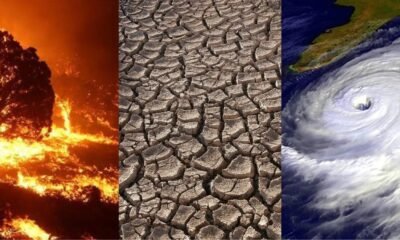Business
Greenhouse Gas: How Industrialisation is worsening Nigerians’ Health conditions

Across Nigeria’s industrial cities, the machines never stop grinding, but so also do Greenhouse Gas emissions (GHG) implications.
Increased manufacturing activities are the desire of any country because it means more products’ output, ability to sell and generate income as well as employment generation for the citizens, but deployment of heavy machines for manufacturing activities has its implications.
For one, it simply translates to heavy noise pollution, high energy combustion, the types that send heavy smokes swirling all around and the prevalence of some negative health conditions.
Involuntarily, for example, individuals in offices and homes nearby as well as passersby inhale heavy smokes and other types of emissions that result from such industrial activities, in good measure.
READ ALSO: Acid Attack That Changed A Man’s Entire Life, Opening His Family To Ridicule
This is clearly the case where those firms have not taken the additional measure of re-routing the smoke emission directions away for vulnerable humans. There are immediate coughing and sneezing, but much more long-term negative impact to the human system.
There might not be physical symptoms to suggest that such emissions are harmful to humans, but their long term impacts remain telling.
However, studies have shown that so much is deposited in the human system with such involuntary inhaling of gaseous elements, especially given that the Nigerian manufacturing sector is dominated by cement and building materials production, food and beverages, tobacco, chemicals and fertilizers, wood, and textiles.
These sectors are characterised by heavy combustion and gaseous emissions.
Nigeria among ten most climate vulnerable countries
The scenario is worse because residential quarters could be located next quarter to industrial plants.
The Climate Score Card, a climate activist portal, quoting the German Mission in Nigeria reported that, Nigeria remained within the top 10 of the world’s most climate vulnerable countries, with Lagos ranking the 10th most vulnerable city in the world since 2014. ,
READ ALSO: What Pregnant Woman Must Do To Avoid Birth Defects
So, Nigeria remains one of the ten most climate-vulnerable countries globally, with multiple sources of greenhouse gas emissions.

While countries with more robust health and environment budgets are increasingly sensitive to greenhouse gas emissions, the case is the other way round for this country of over two hundred million people.
Official records indicate that the Nigerian manufacturing sector is dominated by the production of cement and building materials, food and beverages, tobacco, chemicals and fertilizers, wood, and textiles.
As much as the manufacturing activities of these cement, plastic, and iron companies are desirable in our economy, the issue is that they are major culprits of greenhouse gas emissions problems.
To date, it is not too certain how many of them are committed to reduced or zero carbon gas emissions, but chronic respiratory diseases continue to be an issue in Nigeria.
A recent World Bank study, “the Cost of Air Pollution in Lagos”, Nigeria’s leading industrial city, estimates that illness and premature deaths due to ambient air pollution caused losses of $2.1 billion in 2018, representing about 2.1% of Lagos State’s GDP.
It said in the same year, it caused an estimated 11,200 premature deaths, the highest in West Africa., with children under five being the most affected.
READ ALSO: Will Digital Money Perform Same Wonders In Nigeria?
The report added that this accounted for 60 percent of total deaths while adults suffered from heart disease, lung cancer, and chronic obstructive pulmonary disease.
On the side of companies with heavy machines operations, there are no discernable commitment to reducing the effect of gaseous emissions in the environment, no proof they are committed to decarbonising their production activities.
The manufacturing sector as worst culprit in carbon emissions
Manufacturing activities generate emissions of pollutants that are harmful to humans and the environment, the common pollutants including carbon dioxide, nitrogen oxide, ammonia and mercury. Their constituents endanger water bodies, the atmosphere and land.
Climate Link reporting about GHG emissions, said Nigeria’s total GHG emissions in 2014 were 492.44 million metric tons of carbon dioxide equivalent (MtCO2e), totaling 1.01 percent of global GHG emissions.
“In Nigeria, 38.2 percent of GHG emissions came from the land-use change and forestry sector, followed by the energy, waste, agriculture and the industrial processes sector which contributed 32.6 percent, 14.0, 13.0 percent and 2.1 percent respectively to GHG emissions”.
Such emissions are considered to be responsible for thousands of cases of chronic problems and also premature deaths each year.
They are thus a direct affront, in fact a real threat to life and wellness.
According to the American Lung Association, exposure to the main component of smog (ozone) raises the risk for asthma, and those who grew up or live in urban areas have a higher risk for asthma.
Aside asthma, the discharge of pollutants into the environment can lead to other health conditions like bronchitis, cancer and heart failure.
For experts, it is now left for Nigerian companies to change or adapt their production processes the way their peers in other economies have done.
Rather than processes that involve combustion of fuel, specifically coal, say experts, it is time to mount and deploy green engines or renewal energy processes.
It is now left for Nigeria to resolve to tackle the issue of greenhouse gas emissions successfully? Afterall, the Food and Agriculture Organisation (FAO) for one, has shown commitment to assisting Nigeria in the area of significantly reducing those industrial emissions.
READ ALSO: Our World Is At A Dangerous Juncture –Dr Tedros Adhanom Ghebreyesus
Nifesimi Ogunkua, the organisation’s climate change specialist, said indeed, that FAO would provide unparalleled knowledge, experience, and technical assistance in the areas of biodiversity, climate change, international waters, and land degradation.
According to her, the agency would also offer partnerships in the areas of food systems, ecosystem restoration, amazon, critical forest biomes, wildlife conservation, and sustainable cities in the eighth global environment facility replenishment cycle (GEF-8).
This is obviously a window of support which the Nigerian authorities should not allow to close, if her greenhouse emissions targets would be met.


























Jimoh Elizabeth Oluwaseyi
February 20, 2024 at 3:56 pm
The Editor,
The Eagles Newspaper.
Dear Sir,
Re: TRAFFIC GRIDLOCK IN ISHERI OKE COMMUNITY.
I want to use this medium to draw the attention of the Lagos State Traffic Management Authority (LASTMA) to the traffic gridlock in Isheri.
I believe it is crucial to address this matter with urgency to enhance the smooth flow of traffic and enhance public safety.
During the early hours of major working days around 7:30 a.m. to 8:00 a.m, it has been observed how money collectors stop commercial tricycles causing a major traffic gridlock.
Another contributing factor to this issue is insufficient parking spaces making traders who are car owners to park beside their shops, hindering motorists from enjoying a free-flow ride.
However, it has been observed that the T junction linking Isheri, Magodo and Iwora usually gets congested around 7:30 p.m everyday due to lack of traffic lights and absence of LASTMA at this strategic junction.
To address these challenges, I propose that the money collectors should be orientated to stop their encumbrances causing this traffic gridlock.
Also car owners should be educated through public awareness about the consequences of packing wrongly.
Moreover, the provision of traffic lights or the presence and supervision of LASTMA will go a long way in reducing the traffic gridlock in Isheri community.
Thank you for your attention to this matter.
I look forward to a positive response and meaningful action to address the issue of traffic gridlock in the Isheri community.
Yours sincerely,
Jimoh Elizabeth Oluwaseyi